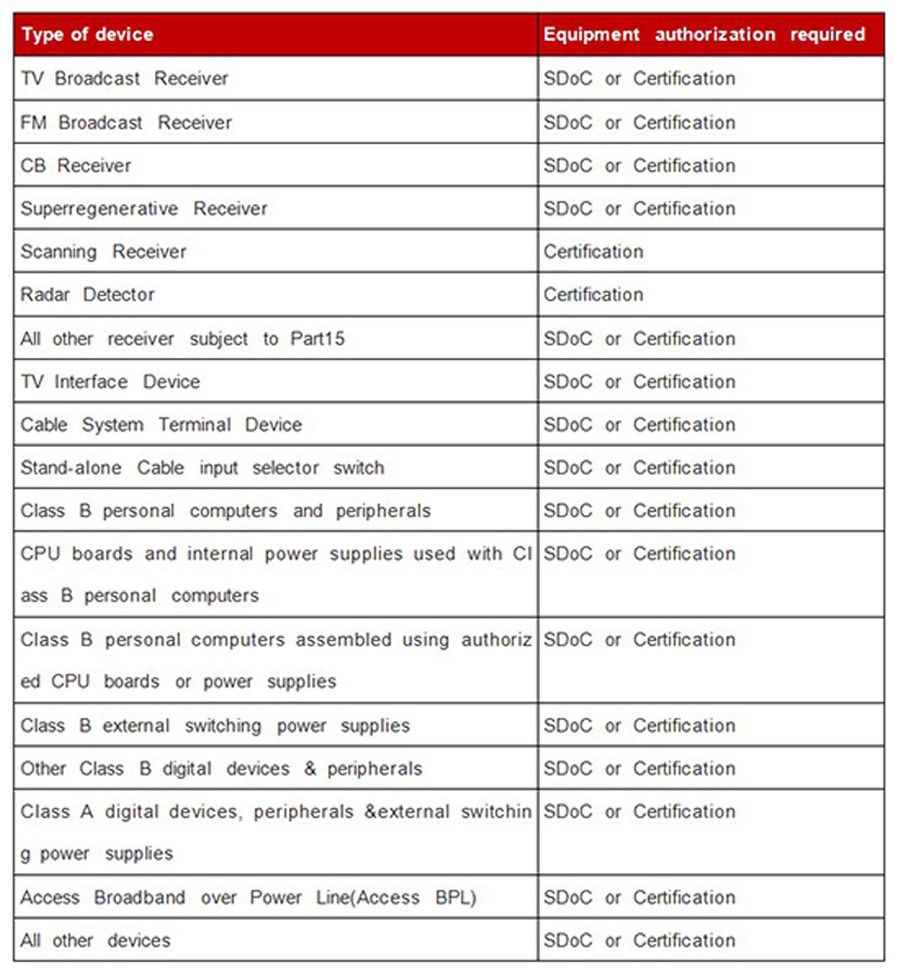As early as November 2, 2017, the Federal Communications Commission(FCC) issued a regulation to simplify the certification process for wireless device equipment and clarify the use of electronic labels, the Verification authentication program was merged into the SDoC, and the transition period was one year. That means, the FCC will use the SDoC certification program from November 2, 2018. The following is a detailed interpretation of the SDoC policy for reference by the terminal manufacturers.
1. what is the SDoC policy?
SDoC (Supplier’s Declaration of Conformity)refers to: the equipment supplier(note: the supplier must be a local company in the United States) will test the equipment that meets the specified standards or requirements and provide relevant documents(such as SDoC's declaration documents) to provide the public with proof of compliance. DoC and VoC Unified merged into SDoC. The SDoC policy simplifies the previously cumbersome and complex FCC certification process, thereby reducing the burden on the enterprise.
2. What is the new policy implementation time node?
From November 2, 2017 to November 2, 2018, the term is a transitional period, during which the FCC Verification and DoC certification procedures or the new FCC SDoC certification process can continue to be used. As of November 2, 2018, the relevant equipments can only use the FCC SDoC certification program.
3. What are the specific improvement measures for the SDoC policy?

4. What are the declarations of conformity required to apply for the FCC SDoC certification process?
If the products are to be tested and certified by the SDoC method, the corresponding declaration documents are required. These declaration documents should be separately paged and shipped with the product along with the manual (One copy enclosed per product, not in the batch):
1) Product names and model numbers that meet the declaration
2) The statement which show products comply with the FCC regulations.
3) Information about local responsible parties in the United States, including: company name, address, contact information, and Internet information.
5. Is the testing required for manufactures if it applies for FCC SDoC certification?
The FCC SDoC certification still needs to issue a test report. There is no need to do testing in the non-FCC authorized laboratory, but in order to ensure that the report is more authoritative, please try to choose the FCC authorized laboratory to do the test. The SDoC test is conducted using the previous test criteria, and testing certification for applying for Certification is mandatory in an authorized laboratory.
6. Which products can apply for the SDoC certification process?
1) For unintentional radiation products applicable to FCC Part 15, the certification method is modified as follows:

2) For the intentional radiation products applicable to FCC Part 18, the certification method is modified as follows:
a.Commercial industrial, scientific and medical products are subject to SDoC or Certification
b.Commercial ultrasonic products (less than 500W and operating frequency less than 90KHz) must be certified by SDoC or Certification
c.Non-commercial industrial, scientific and medical products are subject to SDoC or Certification
d.Allows the use of an electronic screen to display FCC compliance Statements
e.For products applying for SDoC, a local responsible agency in the United States is required to ensure that the product complies with relevant regulations, and can be an importer or manufacturer.
Please refer to the following link for details:
BACL service advantages:
BACL has extensive capabilities and complete accreditation in the field of electromagnetic compatibility. It has authorized test sites in the United States, Shenzhen, Dongguan, Hong Kong, Taiwan, Chengdu, Kunshan, etc. It has more than 20 10m and 3m anechoic chambers and many international advanced SAR specific absorption rate test systems. It is the most powerful testing laboratory in the world.
With the authorization of major international organizations such as A2LA, CNAS, TAF, CMA, BACL can provide customers with US FCC, Canada ISED, EU CE, Australia RCM, Japan MIC, VCCI, Taiwan NCC, BSMI, Korea KC, Egypt NTRA, Singapore IMDA, Vietnam MIC, Hong Kong OFCA and other multi-country testing and certification services to ensure your products enter the international market smoothly!

 CN/中国
CN/中国  US/USA
US/USA  KR/Korea
KR/Korea  DE/Germany
DE/Germany  ES/Spain
ES/Spain VN/Việtnam
VN/Việtnam